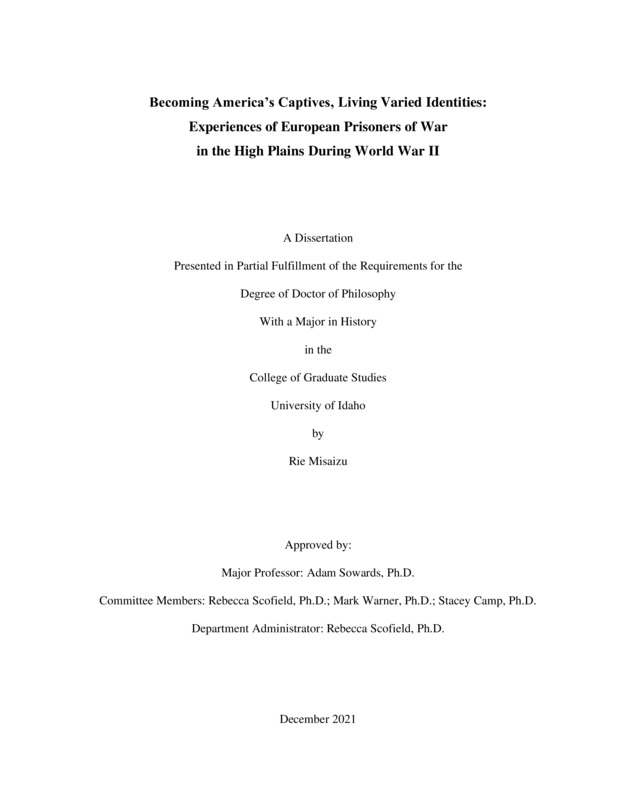Becoming America’s Captives, Living Varied Identities: Experiences of European Prisoners of War in the High Plains During World War II
Misaizu, Rie. (2021-12). Becoming America’s Captives, Living Varied Identities: Experiences of European Prisoners of War in the High Plains During World War II. Theses and Dissertations Collection, University of Idaho Library Digital Collections. https://www.lib.uidaho.edu/digital/etd/items/misaizu_idaho_0089e_12272.html
- Title:
- Becoming America’s Captives, Living Varied Identities: Experiences of European Prisoners of War in the High Plains During World War II
- Author:
- Misaizu, Rie
- Date:
- 2021-12
- Keywords:
- American West High Plains Home Front POW Camp Prisoners of War
- Program:
- History
- Subject Category:
- American history
- Abstract:
-
This dissertation examines wartime experiences of German and Italian prisoners of war (POWs) on the American home front through case studies. After Axis soldiers were captured by the Allies on the war front, the United States took over 420,000 prisoners of war from Europe to stateside between 1942 and 1946. Even though the United States had never incarcerated foreign enemy prisoners of war on that scale, the nation abided by the provisions of the Geneva Convention of 1929 as much as possible and offered humane and fair treatment to the Axis POWs. This is not to say, however, that the United States, American society, and hosting communities accepted America’s captives based on purely humanistic ideals. At federal level, on one hand, America employed various top-down approaches to soften their enemies’ pro-Nazi or pro-fascist ideologies and make them malleable to the U.S. democratic principles. Almost everything POWs encountered was meant to convince them of America’s political, economic, and military greatness incomparable to POWs’ home countries while trivializing socioeconomic and political inequalities experienced by racial minorities. At the local level, on the other hand, many hosting communities expended their effort to employ POWs as agricultural laborers. Daily encounters between locals and prisoners helped them conclude that they were not each other’s enemies but rather friends. In dominantly white rural communities, what helped them understand each other was their cultural closeness and European POWs’ white, Christian, and male identity that offered them a ticket to temporary membership in localities.
- Description:
- doctoral, Ph.D., History -- University of Idaho - College of Graduate Studies, 2021-12
- Major Professor:
- Sowards, Adam
- Committee:
- Scofield, Rebecca; Warner, Mark; Camp, Stacey
- Defense Date:
- 2021-12
- Identifier:
- Misaizu_idaho_0089E_12272
- Type:
- Text
- Format Original:
- Format:
- application/pdf
- Rights:
- In Copyright - Educational Use Permitted. For more information, please contact University of Idaho Library Special Collections and Archives Department at libspec@uidaho.edu.
- Standardized Rights:
- http://rightsstatements.org/vocab/InC-EDU/1.0/

